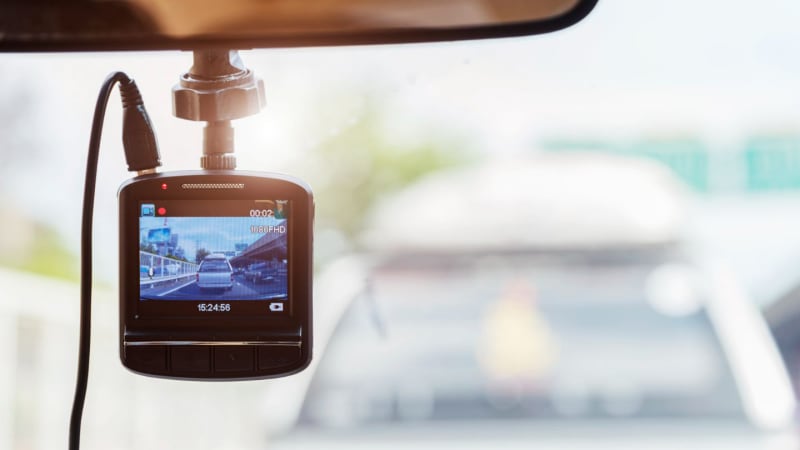What is a dashcam?

A dashcam, short for dashboard camera, is typically a small video camera that’s mounted to your car’s dashboard or windshield and records footage of the front, back or inside of your car ... but how can a dashcam help you as a driver? Dashcams are entirely optional and don't provide accident protection on their own. That said, they provide plenty of other benefits to you as a driver — namely, as a credibility protection measure that can provide evidence to back up your car insurance claim if you get into an accident. Now, let’s zoom in and learn some about some fundamental aspects of dashcams.
Why do people have dashcams?
Drivers choose to have dashcams for a variety of reasons — perhaps most commonly as a tool to protect you as a driver from being deemed at-fault for an accident you didn’t cause. While this may work against you if you caused the accident, high-definition footage from your car's dashcam might provide valuable hard evidence that could help settle the case faster.
Other common reasons drivers install dashcams in their cars might include:
- To record cabin activity as a safety and protection measure for rideshare and taxi drivers.
- To record scenic drives or road trips, possibly for a vlog.
- To monitor employee driving habits while using a company vehicle.
What are benefits of having a dashcam?
As mentioned, dashcams are entirely optional for drivers, but you might consider doing so as they can offer several benefits. For example, gathering car video recordings can:
- Provide evidence after an accident: If you’re involved in a traffic accident, your dashcam could provide crucial evidence to your car insurance provider that supports your case if you didn’t cause the collision.
- Surveil your parked car: Some dashcams offer a parking mode, which records when the car is parked and turned off. If you experience theft or vandalism, your dashcam can provide crucial evidence that could assist local authorities in their investigation. It can also provide evidence for a comprehensive insurance claim to insurers.
- Prevent insurance fraud: Your dashcams might help prevent you from being the victim of insurance fraud by recording staged accidents or false claims that prove your innocence.
- Review and improve driving skills: Your dashcam can record everyday driving footage that you or a new driver using your car can review to identify and correct driving mistakes and habits.
- Record your adventures: Your dashcam is one way to remember the good times by recording your road trips and other cross-country excursions as they unfold around (or inside) your car.
How long does a dashcam record for?
Dashcams can record as much footage as their internal memory card capacity can store. Typically, a standard dashcam can hold 128GB worth of video, which is roughly seven to nine hours of recording time. This varies depending on the make and model of the camera as well as the resolution and other settings you use for your videos. Once the device's storage is full, most dashcams will record on a loop and continuously replace old footage with new footage. So, if you have dashcam footage that you’d like to keep safe, like video evidence of an accident, consider exporting that footage before it’s looped over so you don’t accidentally lose it.
How do you view dashcam footage?
Your dashcam manufacturer's guide will usually explain how you can review your recorded dashcam footage. If you’ve misplaced the manual, a PDF copy of it can sometimes be found online by way of the manufacturer's website. If all else fails, there are usually a few common ways to review dashcam footage.
- Remove the dashcam’s internal memory card and insert it into a compatible memory card slot in a computer or external device capable of reading and replaying media files such as MP4 or AVI formats.
- Replay the footage directly from the dashcam’s device display.
- Download your dashcam’s mobile app (if applicable), then follow the necessary instructions to connect your dashcam to your app and replay footage directly from your phone.
Do dashcams lower car insurance?
It’s uncommon for a car insurer to offer a dashcam discount. For the most part, installing a dashcam won’t lower your car insurance premiums on its own, but it might help you keep your premium from rising.
How? While premiums tend to rise after an accident involving your insured vehicle regardless of cause, your premiums will likely increase even more if you’re deemed at-fault for the accident. If you have dashcam footage handy that proves to your insurer that you didn’t cause the accident, you may be able to prevent having the accident placed on your driving record and avoid paying an even higher premium.
In summary
Dashcams are an optional recording device that can act as a silent witness for you if you choose to install one. Depending on the dashcam model, you can typically watch hours of recorded footage through a computer, smartphone app or directly from a screen on the dashcam device. And, while installing a dashcam may not lower your insurance costs directly, the evidence it records could help prevent you from being deemed at fault for an accident and paying higher premiums because of it.



